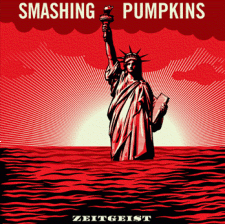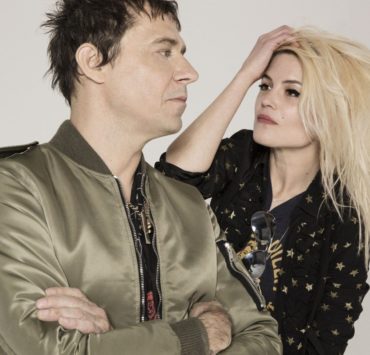It has been a very long time since a new album gave me chills upon the first listen. I had almost forgotten what it was like to grin in excitement through the entirety of a virgin record, where every turn, twist and surprise leaves the rider clamoring for more. My hats off to Billy Corgan for finally achieving such a feat with his re-tooled vision of grunge rock’s darkest flower, The Smashing Pumpkins, and the new album Zeitgeist.
A full twelve years since the last time The Pumpkins created any kind of impact on modern rock, and seven years since the very public break up of The Pumpkins, Billy Corgan returns to the name that put him on the cultural map, and delivers a proper follow up to 1995’s Melon Collie and the Infinite Sadness. Zeitgeist is the cumulation of everything Corgan’s projects within those years sought to be: dark and clever, kitschy and sincere, and most of all, a pastiche of 1970’s arena rock. But this time it’s with a perfect combination of production, song craft, approach and humor (and perhaps time and patience) that Corgan fully realizes and embraces the dreams he’s been harboring his entire life.
Jimmy Chamberlin’s signature drum intro opens the album, giving rise to a dramatic open D-flat bomb, with Corgan slaying the sword deep into the terrain he knows has been his since he laid “I Am One” onto the world. “Doomsday Clock” sounds like the work of a band who just wrapped up touring for Mellon Collie and didn’t skip a beat on returning to the studio to take the anthems of “Fuck You” and “Bullet With Butterfly Wings” to even deeper depths. Roy Thomas Baker’s production, famous for his work with Queen, comes into focus quickly with the thickly layered vocal textures which root the album firmly into 1970’s territory, a perfect compliment to Corgan’s insistence on creating rock music in the image of stadium heroes like Zepplin, Kiss and Bowie.
For once, the kitschy flamboyance of his music comes out as titillating and smart, rather than desperate and contrived. “7 Shades of Black” delivers surprises unheard of in Corgan’s catalog since the days of “Rocket” with highly stylized and hook driven choruses and verses, creative production techniques that show he hasn’t forgotten how to write a ruthless rocker and understands what it means to step up to the Smashing Pumpkins plate. Like the best of Corgan’s music, it’s instantly familiar but unlike anything you’ve ever heard. “Jellybelly” off of Mellon Collie was their last track to deliver such precisely furious rock music. The album slows down and dives a bit into shrugable Corgan territory, with “Bleeding The Orchid” and “That’s The Way (My Love Is).” “Bleeding” comes off as a more realized version of anything off of 2000’s Machina, with the chorus/title coming off as an arbitrary yelp more than anything substantial. He may as well have been shouting “Tying my shoes” or “Ice cream is good.” But still, its production, with dark but shiny guitar value, make it an enjoyable listen. The one-two-three punch of “Tarantula,” “Starz,” and “United States” more than make up for “That’s The Way”‘s unfortunate over-use of the word “baby” (which also sports some fine Machina-era musicianship).
When “Tarantula” takes hold with a lone screechy guitar note, it quickly devours into familiar chuga-chuga licks, a celebration to the sound that lays the foundation for Corgan’s greatest talent: to make his audience sing. “Tarantula”‘s rapturous chorus breaks open like floodgates, and the music that pours out is what made The Smashing Pumpkins a household name to begin with. My very first taste of what the new Pumpkins would be like was listening to “Tarantula” in a basement internet Cafe in Casablanca on really awkward headphones on my birthday before deciding weather or not to buy tickets to any of their 15 shows at the Filmore in San Francisco. The combination of the inherent fidelity flaws in internet streams, and the raw and confrontational mixing of Corgan’s vocals, gave me the feeling of listening to the track on vinyl. In fact, the a warm production and uniquely textured details give the album the distinct flavor of being on vinyl. So much so, when the album is finished, you feel like taking the needle off the record, and putting it back on the shelf somewhere between the Queen and Kiss records.
If you think of “Starz” as the epic track of some 70’s supergroup as performed at Wembley Stadium in 1977, you’d be right. But it doesn’t stop at just being an homage to what was. With Corgan’s keen eye on musics unique relationship to it’s listener, the song invites the audience the explore infinity from within the space of their headphones. The halting stop after a finale of throbbing drum work from Chamberlin’s unrelenting punching is the perfect set up for “United States.” In the tradition of Mellon Collie’s “XYU”, “United States” twists a great deal of anticipation and drama into a scorching long winded rock number which grinds their previous attempt, Machina’s “Glass And The Ghost Children” into the mud. With no hesitation “United States” conquers the territory of the nine-minute-rocker-based-on-stadium-filling-power-chords with authority and respect. Taking queues from Zepplin and Floyd, “United States” doesn’t hide from its influences, but embraces them and gives them a home in modern music.
When so much importance is placed on the idea that bands have to create music that no one has ever heard before, Corgan takes abandon and just plays the way his idols played, because that’s what made him feel good. With this, Corgan reminds us what the point in making music is: to feel good. Even though you can probably predict the chord changes in “United States” you feel Corgan’s love for every one of them, and it keeps you on the edge until the song finally breaks after six minutes of drum crescendo. While “Neverlost” recaptures territory grazed upon with “Cherry” and “Set The Ray To Jerry,” (two fantastic ballady b-sides from Mellon Collie singles), fancy production qualities don’t save “Bring The Light” from sounding like a Foo Fighters number. In the context of shooting for Queen’s throne, “Bring The Light” doesn’t exactly detract from the album, but serves as worthy filler for continuing the album’s themes. “(Come On) Let’s Go” on the other hand, sounds like a Weezer song start to finish. But again, enraptured by Corgan’s clear excitement for the music, it’s hard to not want to listen to it. For the first time in the Pumpkins career, we’re given an album where you can excuse the slightly exaggerated areas because the intention is so pure and clear.
Likewise, “For God And Country” sounds like an updated version of “Heavy Metal Machine,” off Machina. In “Heavy Metal Machine” Corgan was crying about dying “for rock and roll,” and here Corgan makes quips about dying “for God and country.” The inclusion of piano and synthesizers keep the song interesting, and not untolerable. The fact that Corgan still pens songs comparable to those on the ill-fated Machina, is actually quite refreshing. It keeps the sound of the album as a whole authentic. If Corgan just sought to rewrite Siamese Dream, this whole exercise would be an obvious heaping spoonful of 90’s nostalgia. Instead, Zeitgeist truly appears to be a Smashing Pumpkins ready to pick up as if no time has passed. Corgan doesn’t sound like he ever questions what the Pumpkins should sound like, he just keeps making the music without contemplating it. “Pomp And Circumstance” completes the Zeitgeist. And like so many moments on the album, it’s a moment where Corgan finally gets it right.
From “Daydream” on Gish to “Farewell and Goodnight” on Mellon Collie, Corgan has been working hard to nail “the final track,” and “Pomp And Circumstance” is it. The squealing guitar solo, the beautiful la la la’s, and the grand “pomp” of the song gently kiss the listener good-bye, and it genuinely feels like a fresh breath after having traveled at light speed for the duration of the album. It sums up all the parts of the record and doesn’t offer any apologies or attempt to force any final words. The best part is, when its over, you want to listen to it all over again. The last track leaves such an imprint of perfection that you can’t quite remember how you got there, but there’s enough to recall that it was a surprising turn of events, and you want to feel them all again. If Corgan is trying to re-write history and pretend that everything between 1995 and now didn’t happen, Zeitgeist has what it takes to change people’s minds about Corgan’s abilities and intentions. He never wastes the listeners time on the album, and for making statements as grand as he makes them, that’s an important quality that has been absent since he started making double albums.
If that means Corgan has succeeded in recapturing the essence of his band, The Smashing Pumpkins, I’ll be more than happy to grant him that. If it just means he’s succeeded at cleverly making a record that sounds like Queen, then, I’m enjoying it thoroughly.

